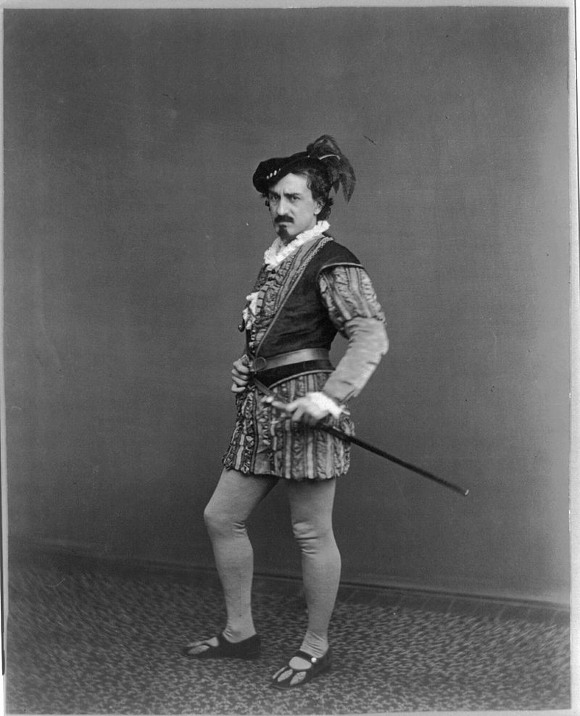Othello Contents
- Religious/ philosophical context
- Theatrical context
Iago, the villain
 Motivation
Motivation
The malevolence which guides Iago seems far in excess of the motivation he declares to Roderigo, that he has been overlooked for promotion by his commanding officer, Othello, who has instead promoted a ‘desk-officer’ (Cassio) (Act 1 Scene 1).
A more deep-rooted reason for vengeance, given that it is revealed in a soliloquy, is the idea that Othello has cuckolded him by sleeping with Iago’s wife, Emilia (Act 1 scene 3). Yet even Iago hedges it with uncertainty (‘I know not if ’t be true, / But I, for mere suspicion in that kind, / Will do as if for surety.’), making it a flimsier pretext. Certainly there is little likelihood of this in terms of the way Othello’s character and previous history is presented.
As an underdog who has been ignored once too often, perhaps Iago has decided that, for once, he is going to pull the strings and engineer his own destiny instead of waiting on others. The overlooked watcher of others has observed how people ‘tick’ and knows exactly how to manipulate their feelings and actions, often by the power of suggestion.
Audience appreciation
Iago appears not to have any redeeming qualities – except that his duplicity is so audacious, and scheming so psychologically clever, that there are times when an audience may almost catch themselves admiring him, or laughing at his machinations. Shakespeare’s plays contain many ‘likeable rogues’ (such as Autolycus in The Winter’s Tale). By using asides and soliloquies, such characters make the audience complicit in their plotting, as does Iago. However, as they witness the irredeemable destruction of admirable people, the audience understands the dreadful consequences of condoning Iago’s evil.
Liar
Iago is villainous towards everyone and lies comprehensively. Generally he only speaks honestly in asides or in soliloquies, but even then the depths of his soul are opaque. Even when the audience knows he is actually revealing the truth, those on stage are so convinced by his ‘honest’ persona that they do not comprehend. In Act 3 Scene 1 Iago even scolds the audience for calling him a villain by using false logic and hypocritical argument.
Sexual politics
Iago consistently displays a cynical attitude to women and in Act 4 Scene 3 his wife reflects the kind of treatment that this attitude has led to. Some critics have speculated whether Iago struggles with homosexual feelings for Othello, whose passionate relationship with Desdemona means that he has clearly repudiated any desire Iago might have had. It might also explain his apparent disgust for heterosexual sexuality.
Cowardice and control
Throughout the play, Iago avoids responsibility and gets others to do his dirty work for him (perhaps a reason for his original lack of promotion). For a soldier, he is remarkably reluctant to act courageously. His attempt to stab his wife into submission in Act 5 Scene 2 disgusts his colleagues (‘Fie! / Your sword upon a woman?’).
At the end, when his treachery has been finally exposed as ‘the practice of a damned slave’, he becomes uncharacteristically silent, refusing to explain or excuse himself, perhaps imagining that by doing so he is still somehow in control. However, he is no match for the might of the state which will be brought to bear against him, much to the satisfaction of the audience.
